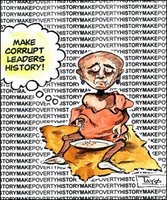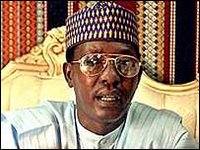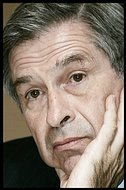 I spent a fair amount of time in Chad in 2005, overseeing relief efforts for refugee populations along the eastern and southern borders with Darfur (Sudan) and northern CAR. I became fascinated with the country, particularly the unsurpassed harshness of its physical environment and the uncanny ability of its ruling elites to dig ever deeper their own political grave. Recent tussles on entirely different fronts--with the World Bank and Sudan--are testing the patience of the international community and the limits of regional stability.
I spent a fair amount of time in Chad in 2005, overseeing relief efforts for refugee populations along the eastern and southern borders with Darfur (Sudan) and northern CAR. I became fascinated with the country, particularly the unsurpassed harshness of its physical environment and the uncanny ability of its ruling elites to dig ever deeper their own political grave. Recent tussles on entirely different fronts--with the World Bank and Sudan--are testing the patience of the international community and the limits of regional stability.Besides 8.6m of its own, Chad currently hosts about 200k Darfuri refugees and over 30k central africans. It somehow survived the drought, locust invasions and pockets of famine experienced by its neighbors, particularly Niger, in 2005. Yet it is an increasingly unstable place, poised on the precipice of political freefall and potential violence, both internally and with its bellicose neighbor, the Sudan. President Idriss Déby, a 53-year-old former army commander who led an armed revolt from the east to seize power in 1990, is a sick man; he is rumored to have Hep E, HIV and cirrhosis of the liver all at once. Most observers expected him to fall to terminal disease or a forced ouster before the end of 2005. A recent photo captures the opulent insulation of a man with many worries and fewer friends.
Where is my tribe?
Infrastructure at all levels within Chad remains profoundly underdeveloped, in part due to ongoing instability and periods of conflict. Natural resources in rural regions struggling to sustain large refugee influxes in the south and east —wood and water, primarily— are severely depleted, giving rise to resource-related conflict between refugees and host populations.
Since Darfur exploded in early 2003 and eastern Chad found itself overrun with Sudanese refugees, the UN-led humanitarian response has stabilised into a well-run care and maintenance operation. Relations between humanitarian agencies and local Chadian authorities and populations, however, are worsening as resentment and pressure to assist destitute locals grows. During my last visit in October 2005, over 200 Chadian troops from the elite presidential guard deserted their post in protest against the Déby regime. More recently, Déby declared a "state of belligerence" with Sudan after a rebel attack on 18 December in the eastern border town of Adre. Chad blamed the attack on Sudan, saying it is financing, arming and equipping Chadian rebels. The two countries have long accused one another of backing rebel factions. This time, Sudanese support seems real. On 30 December a number of rebel factions - all insisting that Deby step down - announced that they were joining forces (Reuters).
A Zagawan himself, Zagawan allegiances across the Chad-Sudan border explain Déby's tenuous relations with Khartoum but offer little predictive capacity regarding Chad's internal instability, itself due to extensive rivalry between Zagawan factions. The Kobe sub-tribe, around Tine and Bahai, object to Déby's recent appointment of his brother as the Sultan of Bahai. Disagreement over the question of support to Sudanese Zagawa in their fight against the Sudanese government, which Déby reportedly forbids, is a source of broader opposition. Zagawan elements of the rebellion in northern CAR do not, however, pose a direct threat to Déby.
Between its more powerful neighbour, Sudan, and Deby's primary political constituency, his Zagawan kinsmen, the Chadian President has effectively held onto power by not choosing sides. While this may appease Khartoum, the strategy has triggered hostilities from Chadian and Sudanese Zagawa, the latter having been instrumental to Déby's successful overthrow of former
President Habré, and now leading the Darfur insurgency. Once thought too disparate to present a credible threat to Déby, the now unified alliance may alter the balance, particularly if Sudanese Zagawans and Janjawid offer support.
Between its more powerful neighbour, Sudan, and Deby's primary political constituency, his Zagawan kinsmen, the Chadian President has effectively held onto power by not choosing sides. While this may appease Khartoum, the strategy has triggered hostilities from Chadian and Sudanese Zagawa, the latter having been instrumental to Déby's successful overthrow of former
President Habré, and now leading the Darfur insurgency. Once thought too disparate to present a credible threat to Déby, the now unified alliance may alter the balance, particularly if Sudanese Zagawans and Janjawid offer support.
Déby's political credibility hinges on his continued ability to prevent an overflow of armed conflict from Darfur and Northern CAR into Chad, a capacity that appears to be slipping from his grasp. His current unpopularity with the rank and file owes more to his being blamed for the country's economic malaise, and to rising anti-Zagawan sentiment nationwide. Regular cabinet reshufflings allow him to placate opposition leaders while ensuring the inefficacy of his administration. While the government denies reports of forced recruitment to bolster an army hit by desertions, security forces continue to assault civilians in the capital as tensions mount across the country.
As if this were not enough for a syphillitic former warlord, Déby is fighting fires on another front, with the grand-daddy of international donors, the World Bank.
My oil, my money
Of other large rumblings I heard during my last Chad visit, that over the World Bank-funded Chad-Cameroon oil pipeline, the situation is has since deteriorated. The Washington Post recently summarized the dispute:
"Despite objections by critics that oil money in such countries is almost invariably squandered or stolen, the bank backed the pipeline in the hope of showing that Africa could use its mineral riches to benefit the poor. It secured an agreement with Chadian leaders that most of the government's oil proceeds would go into a closely supervised escrow fund in London, to be disbursed and invested on the nation's behalf in areas such as education, health and rural development.
"Out of cash for its regular budget amid mounting security problems involving army deserters and refugees on the border with Sudan, the government announced in October that it intends to amend the law governing the petrodollars so it can use a larger chunk of the money for any purpose it likes, including its security forces. Under the proposed new law, the government would double, to 30 percent, the amount of oil money that it can spend without oversight. The government would also halt the diversion of 10 percent of the oil money into a "future generations" fund that is to be spent only after Chad's oil wells run dry.
"All this poses a tough dilemma for Wolfowitz, the former U.S. deputy defense secretary who took the bank's helm last June pledging to put a high priority on intensifying the bank's anti-corruption efforts. The bank has the legal right to take punitive measures in response to any action by the Chadian government to change the agreement, which so far has generated more than $300 million in revenue for public purposes in Chad. But the bank is instinctively loath to cut off financial ties with a country; it argues that the country's poor are likely to suffer most from the withholding of aid -- a painful prospect in Chad, one of the world's most impoverished nations, where 80 percent of the population relies on subsistence farming and livestock raising. On the other hand, if Wolfowitz is too flexible with Chad, he risks exposing the World Bank and himself to criticism that the fight against corruption is little more than hot air.
"The [Chadian] government's cash squeeze suggests that misappropriation of public resources is continuing apace. Normal budget accounting is nonexistent, and bank officials cannot understand how the government can be broke, especially since it has directly received some of the oil money, about $38 million, for its general budget. Allowing the government to take money from the London escrow fund might only invite further waste and would set a terrible precedent for future projects in the oil and mining sector, bank officials fear, by signaling that such "ring-fencing" arrangements don't work."
What of the Chadian argument for reneging on these agreements? "The government has good reason for insisting on changing the agreement. Although world oil prices have roughly doubled since the pipeline deal was signed, the revenue going to the government has been "disappointing," said a Chadian minister, and the government questions the international oil companies' explanation that much of the petroleum being pumped is laden with impurities. "We understand that in principle it's good to save for the future. But the people of Chad don't understand why they should be told they must save for future generations when they have needs right now." Spending money to improve security in the often-lawless countryside, he added, is perfectly consistent with poverty reduction, because "we can't conceive of economic development in an environment which is not secure."
After stillborn efforts at dialogue, today the Bank announced it would suspend Chad's loans for the $4.1 billion project in retaliation for recent Chadian legislation that doubles the percentage of oil revenues the can be spent without oversight, to 30 percent. Chad's National Parliament also scrapped a requirement that 10 percent be set aside in a fund to be used once oil resources run out.
The Bank had lent Chad more than $39m on condition that non-government groups checked its use of oil revenues. The private sector arm of the World Bank, the International Finance Corporation, also lent another $100m and mobilised a further $300m for the pipeline.
Whether Chad's increased security spending will create the stability necessary for development remains to be seen, as Chad's finance minister, Abbas Mahamat Tolli, contended in a recent interview. Revenue to date from the pipeline has not been directed to the social sector as promised. In 2005, Deby managed to pass a law allowing him three terms in office, effectively undermining any pretense to democracy. Former comrades-in arms, in particular Chad's ambassador to Washington, Ahmat Soubiane, was ousted in November and is now seeking asylum in the US (Washington Post).
Chad tied with Bangladesh in Transparency International's 2005 list of most corrupt countries.



No comments:
Post a Comment